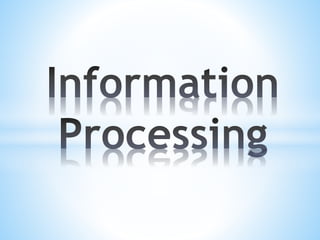
Module 10
- 2. *Describe the processes involved in acquiring, storing and retrieving knowledge *Cite educational implications of the theory on information processing.
- 3. Cognitive psychologist believe that cognitive processes influence the nature of what is learned. They look into how we receive, perceive, store and retrieve information. They believe that how a person thinks about and interprets what s/he receives shape what s/he will learn. These notion is called IPT
- 4. IPT describes how the learners receives information (stimuli) from the environment through the senses and what takes place in between determines whether the information will continue to pass through the sensory register, then the short term memory and the long term memory. Certain factors would also determine whether the information will be retrieved or remembered when the learners needs it.
- 5. *General vs. Specific: This involves whether the knowledge is useful in many tasks, or only in one. *Declarative: This refers to factual knowledge. They relate to the nature of how things are. They may be in the form of a word or an image.
- 6. *Procedural: This includes knowledge on how to do things. *Episodic: This includes memories of life events. *Conditional: This is about “knowing when and why” to apply declarative or procedural strategies
- 7. The stages of IPT involve the functioning of the senses, sensory register, STM and LTM. Basically, IPT asserts three primary stages in the progression of external information becoming incorporated into internal cognitive structure of choice (schema, concept, script, frame, mental model , etc.)
- 8. 8 Keyboard (Encoding) Disk (Storage) Monitor (Retrieval) Sequential Process Getting information into memory Retaining information over time Taking information out of storage ENCODING STORAGE RETRIEVAL
- 9. The first step in the IP model holds all sensory information for very brief time. Capacity Duration There is a difference in duration based on modality: auditory memory is more persistent than visual.
- 10. 1.To bring information into consciousness, it is necessary that we give attention to it .Such that, we can only perceive and remember later those things that pass through our attention “gate”. 2. Getting through this attention filter is done when there is conscious control over attention, or when information involves novelty, surprise, salience, and distinctiveness. 3.Before information is perceived, it is known as “precategorical” information. This means that until that point, the learner has not established a determination of the categorical membership of the information .To this point ,the information is coming in as uninterpreted patterns of stimuli. Once it is perceived, we can categorize, judge, interpret and place meaning to the stimuli. If we fail to perceive, we have no means by which to recognize that the stimulus was ever encountered.
- 11. Capacity- the STM cam only hold 5-9 chunks of information, sometimes described as 7+ / -2. It is called working memory because it is where the new information is temporarily placed while it is mentally processed. STM maintains information for a limited time, until the information is forgotten.
- 12. Duration- Around 18 seconds or less. *To reduce the loss of information in 18 seconds, you need to do maintenance rehearsal. It is using repetition to keep the information active in STM
- 13. The LTM is the final or permanent storing house for memory information. It holds the stored information until needed again. Capacity: unlimited capacity Duration: indefinite
- 14. The executive control processes involve the executive processor or what is referred to as meta-cognitive skills. These processes guide the flow of information through the system, help the learner make informed decisions about how to categorize or interpret information. Example of attention, rehearsals and organization.
- 15. FORGETTING Is the inability to retrieve or access information when needed.
- 16. Two main ways in which forgetting likely occurs:
- 17. DECAY *Information is not attended to ,and eventually fades away.
- 18. INTERFERENCE *New or old information ‘block’ access to the information in question
- 19. Methods for Increasing Retrieval of Information
- 20. Rehearsal- this is repeating information verbatim, either mentally or aloud. Meaningful Learning- this is making connections between new and old information.
- 21. Organization- it is making connections among various pieces of information. Elaboration- this is adding additional ideas to new information based on what one already knows. It is connecting new info with old to gain meaning.
- 22. Visual Imagery- this means forming a picture of the information. Generation- things we ‘produce’ are easier to remember than things we ‘hear’
- 23. Context- remembering the situation helps recover information. Personalization- it is making the information relevant to the individual.
- 25. Serial Position Effect (recency and primacy)- you will remember the beginning and end of a ‘list’ more readily. Part Learning- Break up the list or “chunk” information to increase memorization.
- 26. Distributed Practice- break up the learning sessions rather than cramming all the info in at once (Massed Practice) Mnemonic Aids-these are memory techniques that learners may employ to help them retain and retrieve information more effectively.
- 28. The information received through the senses and goes to the sensory memory for a very brief amount of time. If not found relevant, information may decay. It goes to the STM and if given attention and perceived and found to be relevant, it sent to the LTM. If not properly encoded , forgetting occurs. Different cognitive processes applied to the information will then determine if information can be retrieved when needed later.
- 29. THE END THANKYOU ! AND GOD BLESS!